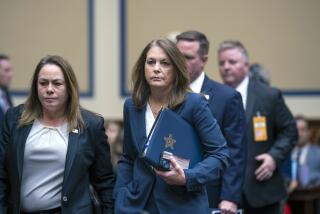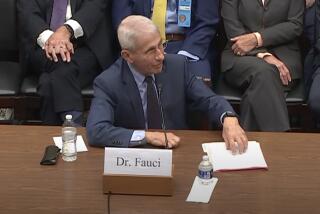Attorney Tells of RTC Effort to Incriminate
- Share via
WASHINGTON — A senior savings and loan regulator Friday accused lower-level officials at the Resolution Trust Corp. of setting her up to make compromising statements about Whitewater-related events, implying that they tried to get her drunk and then secretly tape-recorded her comments.
Testifying before a House panel on the last day of hearings into the Clinton Administration’s handling of the Whitewater case, RTC attorney April Breslaw said she believes that agency investigators may have conspired with their supervisor to arrange the bugged conversations during a controversial one-day visit by Breslaw to the agency’s regional office in Kansas City in February.
One tape-recording made during Breslaw’s visit was later turned over to Rep. Jim Leach (R-Iowa), ranking Republican on the House Banking, Finance and Urban Affairs Committee, which has been investigating Whitewater. A transcript of the tape has been made available to the rest of the committee.
Republicans contended that the taped conversation suggests Breslaw tried to pressure RTC investigators in Kansas City, who were looking into the failure of Madison Guaranty Savings & Loan, to conclude that an ill-fated land venture involving President Clinton and First Lady Hillary Rodham Clinton did not contribute to taxpayer-subsidized losses of the S&L.;
Breslaw denied that she had exerted such pressure, however, saying that she has “no recollection” of suggesting to the Kansas City staff that the RTC’s upper management in Washington “hoped for a particular outcome” of the investigation.
With Breslaw’s testimony, two weeks of inconclusive Whitewater hearings drew to an exhausted close amid partisan recriminations in both the House committee and the Senate Banking, Housing and Urban Affairs Committee, which has also been conducting Whitewater hearings.
As the hearings ended Friday, Republican lawmakers, led by Sen. Alfonse M. D’Amato (R-N.Y.), called again for the resignation of Deputy Treasury Secretary Roger Altman.
Republicans charge that the evidence shows Altman lied to Congress when he testified about Whitewater before the Senate committee earlier this year and they charge that he has still not told the truth about his involvement in the matter.
“Even at this late date, Mr. Altman continues to temporize, excuse, dodge and shift blame in a desperate effort to cling to his public office,” charged D’Amato, the Senate panel’s ranking Republican. “He should behave honorably and leave.”
Senate Democrats on the panel declined to join the attack publicly, yet they remain “highly troubled” by Altman’s testimony, noted Committee Chairman Sen. Donald W. Riegle Jr. (D-Mich.).
Specifically, committee members charged that Altman deliberately misled them when he said at hearings Feb. 24 that he knew of only one “substantive” Whitewater-related contact between White House and Treasury officials. But over the last week, the House and Senate panels have heard testimony about as many as 40 such contacts, including four involving Altman personally, by the time of his Feb. 24 appearance.
The Senate committee also heard testimony over the last week by several senior White House officials who said they realized as Altman was testifying at the earlier hearing that he was not giving complete answers. They were especially alarmed that Altman did not tell the senators that he had decided to disqualify himself from the Madison Guaranty case but delayed the decision after then-White House Counsel Bernard Nussbaum urged him at the Feb. 2 meeting to reconsider.
D’Amato said that these and other omissions in Altman’s earlier testimony had destroyed the Treasury deputy’s credibility with Congress to the point where it could never be repaired.
“From this day forward, we will be unable and unwilling to accept or rely upon any statement, action or judgment of Roger Altman,” he said as the hearings came to a close.
Riegle, meanwhile, admonished White House Counsel Lloyd N. Cutler, the panel’s last witness Friday, that “we cannot have situations arise in the future where witnesses come before committees of Congress and are anything less than fully candid.
“Pass that message . . . to every nook and cranny of the executive branch.”
Cutler, in his testimony, continued to insist that no one in the Administration ever sought to interfere with or impede the RTC’s investigation into Madison Guaranty.
Although partisanship was much less evident at the Senate hearings than it had been in the House, a heated exchange of political charges occurred as Cutler clashed with Sen. Christopher S. Bond (R-Mo.), when the latter characterized the Clinton Administration aides who have testified over the last week as people who “cut corners, shaved the truth and lied” and suggested that documents might have been shredded.
Visibly angry, Cutler called Bond’s characterization unfair and reminded the senator that his party had been responsible for Watergate and the Iran-Contra scandal.
In the House, meanwhile, Breslaw tried to take the offensive to explain her role in the RTC’s handling of its investigation into Madison Guaranty. While not denying that she made the statements secretly recorded in Kansas City by RTC investigator Jean Lewis, she charged that Lewis and others in the Kansas City office appeared to be working together to trap her into saying something that would prompt questions about her involvement in the case.
Breslaw said that when she visited Kansas City to determine the status of the case, Richard Iorio, a supervisor in the criminal investigations office in Kansas City, took her to lunch with several other investigators and “encouraged me to drink alcohol. I declined.”
Later in the day, she added, Iorio repeatedly urged her to meet privately with several investigators, including Lewis.
“In retrospect, it was odd that Mr. Iorio went to such lengths to escort me to the offices of his staffers and then purposefully left us alone to talk,” Breslaw said. “It is possible that he was aware that one or more of his employees’ offices were bugged but did not want his own voice recorded,” she added.
“While I was in Kansas City, no one informed me that our conversation was being recorded,” she noted, referring to her discussion with Lewis. “Moreover, Ms. Lewis went out of her way to make the conversation appear casual. . . . She encouraged me to sit on the sofa in her office and did not take notes of our discussion.”
Lewis and other investigators from Kansas City declined to testify at Friday’s hearing to respond to Breslaw. Lewis, who was asked to testify by Rep. Henry B. Gonzalez (D-Tex.), chairman of the House panel, said that she wants to wait until the scope of the hearings is expanded to allow her to discuss the entire Whitewater case.
More to Read
Sign up for Essential California
The most important California stories and recommendations in your inbox every morning.
You may occasionally receive promotional content from the Los Angeles Times.













